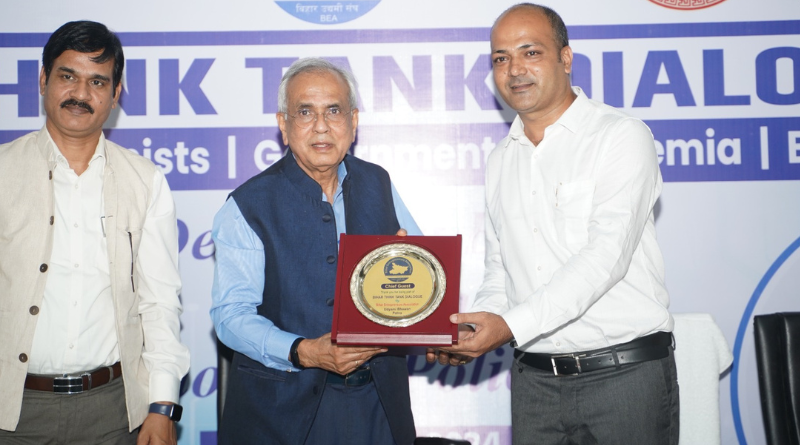India can develop only through the growth of lower strata, says Dr Rajiv Kumar.

India can develop only through the growth of lower strata, says Dr Rajiv Kumar.
Patna July 12: Former Vice Chairman of Niti Aayog, Dr. Rajiv Kumar, emphasized that the development of the country is possible only through the development of its lower strata.
Speaking at the Bihar Think Tank event in Patna on Friday, Kumar highlighted said: “200 years ago, India held a 28% share in the global market, earning it the title of the “golden bird.” However, by 1947, this share had decreased to 18%, and by 2024, it is projected to fall to 2.5%.”
He stressed the need to increase India’s share in foreign trade through new strategies.
Kumar underscored the significant role that entrepreneurs and startups can play in enhancing India’s economic development and increasing its share in the global market.
“At the policy level, India’s carbon footprint, which stands at four gigatons of carbon emissions, the intellectuals need to remain vigilant and work towards reducing these emissions,” Kumar said.
He advocated for bio-natural farming and the production of quality food products.
“By doing so, India can contribute to the export market through agricultural products, thereby aiding in the country’s development,” he said.
Kumar’s insights at the Bihar Think Tank event underscore the importance of focusing on grassroots development, innovative strategies, and sustainable practices to drive India’s progress.
Kumar talked about the future of plastic by proposing seaweed as an alternative material, emphasizing its potential to serve as a sustainable substitute.
He concluded his talk by highlighting key principles of climate change mitigation, adequacy, sustainability, and inclusivity.
Kumar drew a parallel to China’s development, which began at the county level and expanded to the entire country, suggesting that similar collaborative efforts between Indian youth and the government on policy matters can drive comprehensive national development. By working together, India can achieve the status of a developed nation.
Abhishek Kumar, Secretary-General of the Bihar Entrepreneurs Association (BEA), highlighted the association’s efforts over the past decade in raising awareness among youth, women, and farmers at the grassroots level across Bihar about the various opportunities in entrepreneurship. BEA has been visiting every district to provide information, training, and support through incubation centers.
Shashank Kumar, Founder of Dehaat, elaborated on his initiatives to strengthen the agriculture sector by connecting with millions of farmers and offering services to enhance the agricultural ecosystem.
“The example of Silicon Valley Yogi in America, showcasing how a conducive environment for business, with investors and angel investors engaging positively, can foster growth,” Shashank Kumar said.
Professor Shyama Rai, Vice Chancellor of Munger University, emphasized the need to establish training and incubation centers at the rural level.
“These centers would provide necessary training to the youth in remote areas, allowing them to develop their talents and emerge as skilled entrepreneurs at both the state and national levels,” Rai said.
Dr. Hanif Mewati, Director of Khadi Village Industries, Government of India, discussed the potential for subsidies related to the Khadi Industry. He explained how established village industries are working on various employment-related schemes for the country’s youth.
EOM.
Pingback: - Hyderabad Congress thanked top leaders waiving crop loans.
Pingback: Food processing policy expected to pass in a cabinet meeting.